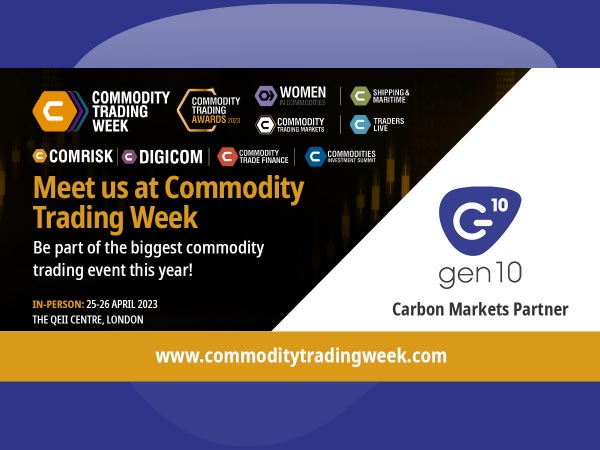Commodity Trading Week returned to London for 2023 on 25th and 26th April. There were over 100 speakers taking part in presentations and panels across 8 inter-related commodity conferences, including conferences dedicated to commodity digitalisation, trade finance, shipping, and the flagship ComRisk event.
The Gen10 team attended the event as sponsors and Carbon Markets Partner, and you may have caught Gen10’s Bruce Tozer on the Data driven sustainability panel. We had some great conversations across the two days and learned a lot from the sessions we attended.
We particularly noticed that even in sessions that were not explicitly related to ESG, issues around carbon, the environment, and social responsibility came up frequently, showing how the ESG agenda is now firmly embedded in commodity trading. Below, we summarise comments from various panellists and presenters on the evolving role of ESG in commodities.
The war in Ukraine
The war in Ukraine is still having an impact on global trade and is expected to carry on for a long time. As well as the humanitarian toll and disruption to many supply chains, it is impacting all 3 areas of ESG; presenting environmental, social and governance challenges.
Although some areas of the country’s supply chain are returning to normal, sanctions will have an ongoing impact, making corporate governance more of a priority. Regulatory compliance is more challenging because sanctions are being constantly revised, and different regulators focus sanctions on different activities, with OFAC focusing particularly on maritime shipping, and the EU more likely to target individuals.
But also markets are trying to be more prudent than sanctions and many are going above the minimum compliance standards. One panellist explained that this behaviour is due to the moral issues tied up in the conflict, which shows that ESG thinking is now embedded in the way businesses operate.
The panel discussing the war also stated how they believe that it will not put a stop to the industry’s sustainability efforts, even if it does present an additional short-term barrier.
ESG requires collaboration
There is increasing demand for ESG compliance and sustainability reporting for products on the market even now that we are facing a worldwide cost of living crisis. And even if you’re not interested in sustainability, the rest of your value chain is. This means that greening provides a competitive advantage in terms of financing and customer sentiment.
And stakeholder interest covers all of ESG. For example, agricultural commodities have been working on social and human rights issues for years, and now there is more of a focus on carbon and biodiversity, but this doesn’t mean that the social issues are ignored.
With long and complex global value chains, due diligence and ESG compliance rely on a joined-up supply chain and need international cooperation. In one discussion of trade digitalisation it was highlighted that transparency was one of its key drivers. And another presenter explained how we need a method and a matrix to achieve our common ESG goal.
Common goals and standards are beginning to develop in some areas. For example, the EU has introduced carbon reporting and carbon taxes will soon follow. But the fact that there are no common KPIs to measure ESG in value chains is a problem and the industry needs support to come up with them.
And even when a particular value chain has an initiative, they don’t talk to each other across commodities. However, to effect meaningful, sustainable change and improve industry practices across the environmental, social and governance landscape, we need collaboration across value chains, and between government and industry.
This article is continued in part two, where we will be exploring the discussions around social responsibility and human rights, environmental considerations in commodities, and the role of data in solving the challenges raised.



